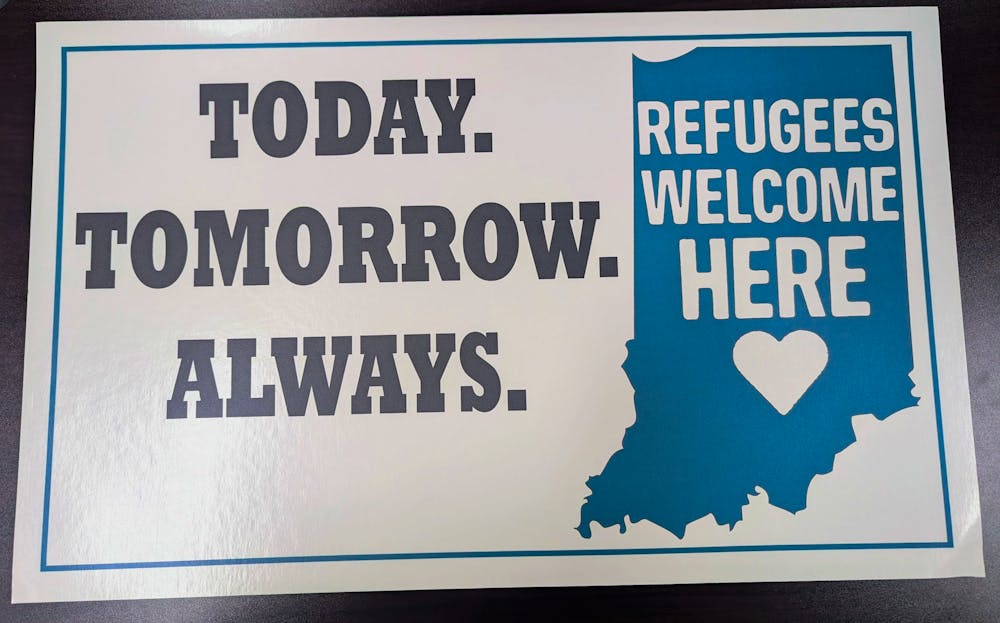Within hours of taking office, the Trump Administration announced the suspension of the U.S. Refugee Admissions Program, which seeks to offer security-vetted refugees a chance to start a life in the United States.
Exodus Refugee, a resettlement agency in Indiana that provides services to refugees from the point of arrival to self-sufficiency, has closely experienced the impact of the executive order.
According to Cassandra Sanborn, director of development at Exodus, refugees are the most vetted group to come to the United States. Consequently, it can take years before a refugee steps foot on U.S. soil. Families can become separated in this process.
In January, Exodus resettled an elderly woman from the Democratic Republic of Congo, Sanborn said. Not unusually, her case was separate from her children and grandchildren’s.
“The plan was that in February, her children and grandchildren were going to come,” Sanborn said. “The plan was it was going to be a whole family unit. Grandma was going to live with the family, help provide childcare. Mom and Dad were going to work.”
However, with the suspension of the refugee resettlement program, it’s unclear when the family will be reunited.
“She’s alone now,” Sanborn said. “And certainly, never expected to be living as an elderly woman in a brand-new country, completely on her own.”
Her story is one of hundreds. Sanborn said Exodus had 118 people scheduled to arrive in Indiana before the suspension of the refugee resettlement program. Exodus had to call the families who had plans to reunite, some of which have waited years to see their loved ones.
“Imagine you're setting up this spare bedroom in your house to welcome them,” Sanborn said. “You are thrilled. You're so excited that you're going to be able to wrap your arms around them again that first day in the airport. And then you get a call from Exodus saying, ‘Hey, actually, they're not coming.’”
The suspension of the resettlement program impacts more than just incoming refugees.
Pete Lenzen, director of the Bloomington Refugee Support Network, said that American leaders’ rhetoric on immigration has created fear in our communities. He said that too often, President Donald Trump and Gov. Mike Braun use the term “illegal alien” without a clear definition.
Just last week, Gov. Braun signed an executive order directing Indiana law enforcement agencies to cooperate with U.S. Immigration and Customs Enforcement.
“Over the last four years, the increase in illegal aliens flooding our country has created a significant threat to public safety for Hoosiers,” Gov. Braun said in a Jan. 28 press release.
Lenzen explained the severity of such comments.
“Many people that aren’t deep into the details of immigration think, ‘Well, illegal alien must mean everyone that’s not a green card or a citizen,” Lenzen said. “That’s absolutely not the case.”
Such misinterpretations can have serious consequences, even for those with legal status.
“We're seeing reports throughout the country, that even people who do have status are being stopped and detained by federal officials,” Sanborn said.
Lenzen said one of his asylee friends was pulled over outside of Bloomington for a minor traffic violation. When the friend presented his foreign license to the policeman, which he is legally allowed to use in Indiana, the officer said he would have to go to court.
Often, refugees flee their home countries because of abuse by their government, including the police. Lenzen explained that when refugees and asylees arrive, they are taught that the police are fair, that they are their friends.
“Well, now they say, ‘Wait, this is the same as our country. We can’t trust the police anymore.’” Lenzen said.
In the past week, five people with legal standing have asked Lenzen to drive them to doctor’s appointments, simply because they are afraid.
According to Sanborn, similar fears drove Exodus to transfer their Bloomington office operations to a virtual setting until further notice.
The executive order outlining the “realignment” of the U.S. Refugee Admissions Program says the U.S. “lacks the ability to absorb large numbers of migrants, and in particular refugees, into its communities in a manner that does not compromise the availability of resources for Americans, that protects their safety and security.”
This statement suggests that refugees compromise the American economy and Americans’ safety. Sanborn said such claims are short sighted.
In 2024, the U.S. Department of Health and Human Services published a study which estimated the net fiscal impact of refugees and asylees to the U.S. government from 2005 to 2019.
“This study found that refugees and asylees contributed $123.8 billion more to our country than they cost in expenditures to federal, state and local governments and that's because refugees pay taxes like you and I,” Sanborn said.
She added that refugees tend to thrive after arriving in the US.
“They don’t really have any other options,” she said. “You can’t go home if home doesn't exist anymore, if home is a war-torn, ravaged country, right?”
Beyond economic benefits, Lenzen and Sanborn both said that refugees make significant contributions to our communities. Sanborn hopes that while the resettlement program is paused indefinitely, the community doesn’t lose sight of the ways in which refugees make Bloomington more diverse and beautiful.




